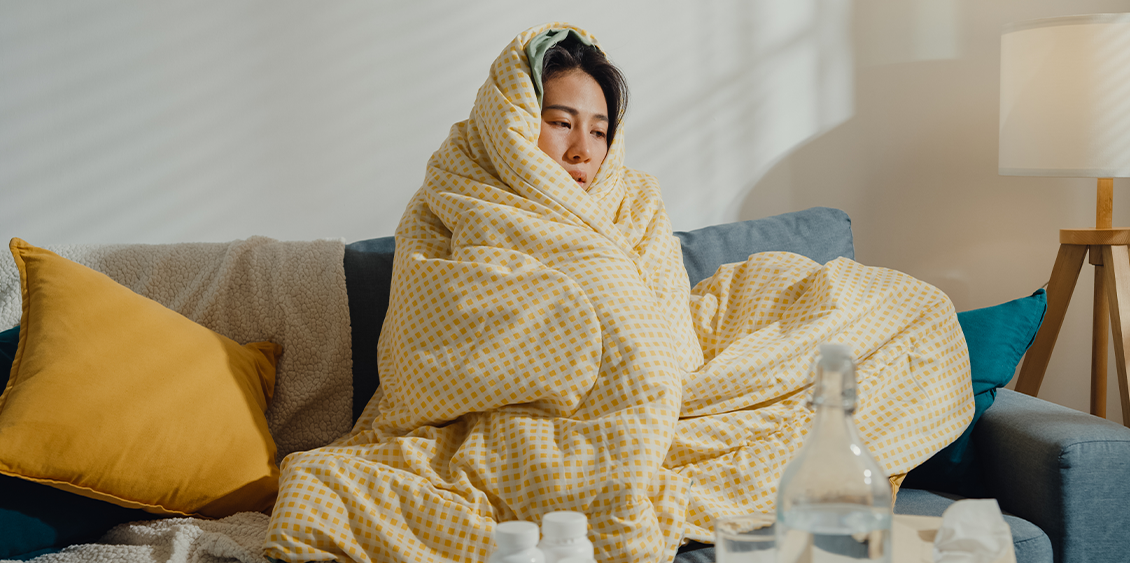Being immunocompromised means having a weakened immune system, which makes the body less able to fight infection. Certain chronic illnesses, certain medications, and some types of medical treatment, such as a transplant, radiation treatment, or chemotherapy, can compromise the immune system.
Read on to learn more about being immunocompromised and how to strengthen your immune system and stay healthy with appropriate preventive measures.

How do you know if you’re immunocompromised?
Signs and symptoms to watch out for include:
- Unusual fatigue that won’t go away
- Frequent infections, or more severe ones than normal
- Slow wound healing
- Increased susceptibility to viral illnesses such as colds and the flu.
A compromised immune system is sometimes hard to detect. It often manifests as common, mild symptoms such as frequent or recurring infections, e.g., ear infections, lung infections, diarrhea. It’s important to discuss these symptoms with a health care professional to confirm whether or not they indicate that you are immunocompromised.
How do people become immunocompromised?
The following are the main causes of a weakened immune system:
- Certain types of disease
- Specific medical treatments (chemotherapy, radiation therapy, transplant surgery, etc.);
- Taking immunosuppressants
- Taking immunomodulators
- Severe respiratory or viral infections
- Inherited immunodeficiency disorders
- The body’s natural aging process.
What is an immunosuppressant?
An immunosuppressant is a type of medication that reduces or blocks immune system activity. Immunosuppressants are used to prevent transplant recipients from rejecting their new organs and to treat certain autoimmune diseases, such as lupus and rheumatoid arthritis.
What is an immunomodulator?
An immunomodulator is a type of medication that modifies immune system activity in order to regulate it. Immunomodulators can be used to either increase or decrease certain immune responses, as the case may require. Among other things, they are used to treat autoimmune disease, reduce chronic inflammation, and improve the effectiveness of certain kinds of cancer treatments.
Which illnesses compromise the immune system?
As mentioned above, some types of illness can compromise the immune system:
- Chronic diseases, including some types of cancer, HIV, kidney failure, and poorly controlled diabetes
- Autoimmune diseases, such as rheumatoid arthritis, lupus, multiple sclerosis, and Crohn’s disease
- Severe infectious diseases, such as tuberculosis and hepatitis B
- Rare hereditary diseases, such as severe combined immunodeficiency (SCID), ’sX-linked agammaglobulinemia, and common variable immune deficiency (CVID).
What’s the difference between being immunocompromised, immunosuppressed, and immunodeficient?
The terms immunocompromised, immunosuppressed, and immunodeficient are often used interchangeably. However, immunodeficient has a slightly different meaning from immunocompromised or immunosuppressed. The terms are compared below.
Immunocompromised/immunosuppressed
People who are immunocompromised or immunosuppressed have a temporarily weakened immune system, usually due to medical treatment such as a transplant or chemotherapy. Oftentimes, they consent to have their immune systems weakened for a specific purpose, such as to stop a disease from spreading, or to prevent the body from rejecting a transplanted organ. Generally, once the treatment is complete, the body regains its natural ability to defend itself.
Immunodeficient
Being immunodeficient means having a weakened immune system because of a chronic illness or genetic immune system disorder. Immunodeficiency lasts longer than being immunocompromised/immunosuppressed, since the immune system is weak due to an underlying health condition rather than voluntary medical treatment. These conditions may include diseases such as HIV/AIDS, leukemia, lymphoma, multiple myeloma, or diabetes.
What are the risks involved with being immunocompromised?
Being immunocompromised usually makes people more susceptible to common infections such as colds, the flu, and COVID-19. It also carries a high risk of serious complications, especially with regard to infections of the lungs, skin, or gastrointestinal system. For example, bacteria such as pneumococcus (Streptococcus pneumoniae) can cause severe pneumonia, or even serious complications such as meningitis or septicemia.
For immunocompromised people, normally mild infections can become dangerous, requiring hospitalization.
Regular medical check-ups and additional protective measures such as vaccination are important for immunocompromised people to stay healthy.
In case of infection, how long should an immunocompromised person isolate?
The recommended isolation time will depend on the type of illness involved, the type of treatment underway, and the immunocompromised person’s overall medical condition.
It may be up to 21 days, especially in case of COVID-19 or other kinds of high-risk, contagious diseases. This precautionary measure is intended to limit complications, protect the immunocompromised person, and reduce the risk of infecting the people around them.
The appropriate isolation time for your particular situation can only be determined by a qualified health care professional.
How long do people remain immunocompromised after chemotherapy?
The amount of time varies from one individual to the next and depends on the treatment protocol. The immune system usually starts to recover a few weeks after treatment ends, but could take 3 to 12 months to heal completely. Personalized medical care is needed to ensure appropriate monitoring during recovery.
The flu and COVID-19 vaccine: optimum protection for the immunocompromised
Vaccination is key for reducing an immunocompromised person’s risk of infection. Although certain types of live attenuated vaccines, which are made from weakened forms of viruses, may be contraindicated for immunocompromised persons, other vaccines are strongly recommended. Among those strongly recommended are the flu vaccine and the COVID-19 vaccine, since both illnesses are especially dangerous for people with weakened immune systems.
In some cases, an additional dose of the vaccine may be recommended to provide even better protection.
In addition to being vaccinated themselves, immunocompromised people are safer when the people around them are vaccinated. When the people close to an immunocompromised person are also vaccinated, it creates a protective "cocoon".
Practical tips for immunocompromised people
Your Brunet-affiliated pharmacist-owner can give you advice on living with immunosuppression. You can count on their expertise to inform you about preventive measures, follow up on your vaccinations, and answer any questions you might have.
Be sure to incorporate the following key habits:
- Pay close attention to daily hygiene: Wash your hands frequently and disinfect surfaces.
- Implement additional protective measures during peak viral seasons: Wear a mask and keep your vaccinations up to date.
- Maintain a safe, balanced diet: Avoid raw or undercooked foods and anything that could pose a contamination risk.
- Regularly consult a professional to monitor your health.
See your pharmacist for personalized advice and adequate protection.
More articles that might interest you
5 tips to boost your immune system
Last updated on October 7, 2025
